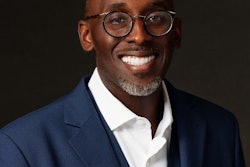Up and Running
Former AAHE Hispanic caucus strikes out on its own and sets an ambitious agenda
SAN ANTONIO
“It was more than we could have ever imagined,” says Dr. Loui Olivas, referring to the attendance and support that the newly formed American Association of Hispanics in Higher Education (AAHHE) received at its first national meeting held in San Antonio earlier this month. “We had hoped to get up to 150 attendees. Not in our wildest imagination could we foresee over 300 registrants.”
Olivas is the first president of AAHHE, the organization that until last year was a caucus of the now defunct American Association for Higher Education (AAHE). He says he heard his feelings echoed by many of the meeting’s attendees, who ranged from college freshman to long-time advocates for Hispanic access to higher education.
But the success of the new organization’s launch was not left to chance. He and Dr. Alfredo G. de los Santos Jr., AAHHE’s vice president, guided the project from the beginning to ensure such an outcome.
“Last March at the AAHE conference it was clear that they were going under even though no formal announcement had been made,” says de los Santos, a research professor in the Hispanic Research Center at Arizona State University. “We could tell that AAHE was in trouble and that we needed to start thinking about the future of the Hispanic caucus.” At that point, he and Olivas, the assistant vice president for academic affairs at ASU, realized that they had the perfect opportunity to get their organization off the ground.
“Our president, Michael Crow, is a very forward and entrepreneurial thinking leader. He not only gave us the space but also provided us with part-time graduate and administrative support. He shares our vision,” Olivas says.
Crow has also pledged to support the organization over the next three to four years. And the organization hopes to have its own full-time staff and office space within that time frame.
The founders and organizers’ ability to obtain corporate support from ConAgra, Anheuser-Busch and Southwest Airlines, among others, also made AAHHE’s national meeting a reality. ConAgra and Anheuser-Busch have senior vice presidents on AAHHE’s board, as does State Farm Insurance. And a number of higher education institutions offered sponsorship support, including the University of Texas-San Antonio, The University of Texas-Austin, Miami Dade College, Texas State University-San Marcos and Texas A&M University-Kingsville.
Finding a Niche
Despite a successful first conference, the organization has faced the question of whether another higher education association to address the needs of Hispanics is necessary.
“There is plenty of room for an organization that focuses on the mission of taking the research by faculty members and bringing it to bear on the needs of Hispanic students, faculty and leaders,” says Dr. Jaime Chahín, dean of the College of Applied Arts at TSU-San Marcos. “We want to speak to scholarship in the academy from a Hispanic perspective,” he says.
Says Olivas, “One of the reasons we have an awards luncheon is that no other organization or entity rewards and recognizes the work of Hispanic and non-Hispanic researchers and scholars about this work from a Hispanic perspective.”
According to de los Santos, the goal is to create an organization that nurtures the intellectual needs of Hispanic administrators, academics and graduate students.
“We will work with other organizations like [National Council of] La Raza and HACU (the Hispanic Association of Colleges and Universities) but we will not align ourselves with them,” de los Santos says. “Our approach will be to overlap policy, research and practice under one manageable arrangement that will have tangible and measurable results.”
As the Hispanic caucus strikes out on its own, AAHE’s Black caucus is taking a more guarded approach.
“We’ve decided that for the time being we will focus on our well-established leadership and mentoring institute,” says Dr. Joseph H. Silver, senior vice president for academic affairs at Savannah State University and one of the Black caucuses’ staunchest supporters. The institute, which convenes at Savannah State, enrolls approximately 30 rising administrators each summer. Support for the institute has come from the AT&T Foundation, the American Council on Education and Savannah State.
The Black caucus will also continue to sponsor their study abroad trips to Africa and other destinations. The caucus has met twice since AAHE disbanded, and actually considered going the same independent route a few years ago. However, unlike the Hispanic caucus, historically, the group felt like their needs were being addressed by AAHE, according to Dr. William B. Harvey, vice president and chief diversity officer at the University of Virginia.
In the meantime, the groups sound like they are amenable to working together.
“We have heard from the Black caucus and would love to work with and help them,” Chahín says.
— Frank L. Matthews
© Copyright 2005 by DiverseEducation.com


















